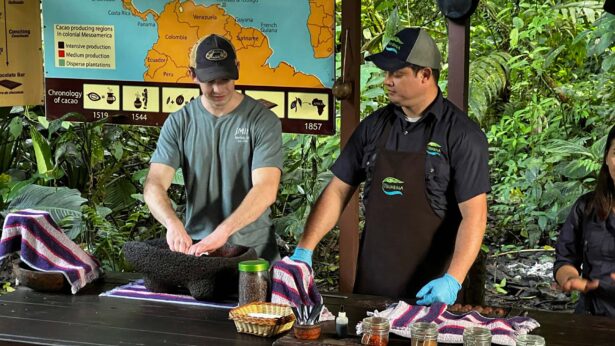By Patricia McDaniels
“We just didn’t want to see houses built on it. It’s more important to me to help my kids keep the land than to give them money.”
The sentiments of Fred Baker and of Fay, his wife of fifty years, are echoed all across Tennessee. Farmers and owners of tracts of forest and open land wish to preserve their green spaces for future generations. Yet, despite their best intentions, that’s not what always happens.
Landowners often fail to pass large tracts of property to the next generation. Maybe there’s a lack of interest in farming by other family members or an inability to make the family farm a profitable operation. Perhaps local communities have failed to make working farms welcome by passing unfavorable ordinances or by allowing imminent domain to break up valuable tracts. In some cases, the only way surviving family members can settle an estate or pay estate taxes is to sell tracts of the property. Whatever the reasons, the trend is evident. Tennessee is losing farmland and green spaces at an alarming rate.
According to the Tennessee Farmland Legacy Partnership, an organization dedicated to the preservation of the state’s farms and forests, Tennessee has been losing an average of 1,300 family farms a year. That’s an average of 100,000 acres removed from productivity annually. To complicate matters, Alice Rhea, a UT Extension farm management specialist, says the future availability of land suitable for farming is at risk.
“Sixty-one percent of all Tennessee farmland is controlled by an operator who is over fifty-five years old,” Rhea says. Because these older farmers work primarily on-farm and own most of the actual farmland, land availability is becoming an issue. “With younger farmers working primarily off-farm, the future of Tennessee agriculture depends, in part, on the successful farm succession planning between current and future generations of farmers,” she adds.
UT Extension, as a unit of the UT Institute of Agriculture, is a member of the Tennessee Farmland Legacy Partnership, which was formed to encourage planning by landowners and communities to promote the preservation and viability of working farms and forests. Partnership members—including the Tennessee Department of Agriculture, the Tennessee Farm Bureau Federation, Cumberland Region Tomorrow, and the Land Trust for Tennessee—believe the future of Tennessee’s $3-billion agriculture and forestry industry depends on the ability of exiting farmers to transition their land and resources to new generations of landowners.
The members of the partnership collaborate to help landowners wade through the variety of preservation options, from conservation easements to land trusts and private estates. Guidance is also available for communities looking for ways to plan for growth while preserving aspects of their rural heritage. Extension’s role has been landowner education.
Planning for the future is essential, says Rhea. She advocates that families be proactive in succession planning. “Competing interests among family members, economic and development pressures, or a combination of reasons make the topic difficult for some to approach,” says Rhea. “But failing to plan is not generally a good solution for the family or for society.”
Rhea and others are concerned that without adequate planning, Tennessee may face a shortage of productive farmland. As part of a team comprising UT faculty members and extension agents Michael Wilcox, Jane Howell Starnes, Laura Howard, Christopher Clark, Alan Galloway, Dena Wise, and Christopher Sneed, all of whom specialize in community and family resources, Rhea collaborated on an estate-planning guidebook, Planning Today for Tomorrow’s Farms. The guidebook is the primary tool used in a series of estate-planning workshops conducted by UT Extension for those interested in exploring plans for the future use of their land.
To date, UT Extension has presented some twenty workshops, and the partnership has coordinated a statewide conference for the benefit of more than 700 landowners. Participants have ranged from first-generation farmers to those who have worked their family farms all their lives.
One of the sessions was conducted by Troy Dugger, director of Hickman County Extension, and his colleague Brenda Van Cleve. At their four-week workshop on estate planning, insurance, and farmland legacy issues, eleven families devoted an evening a week to the sensitive topic.
“It’s a subject they don’t like to talk about. None of us does,” says Dugger. “But they listened and asked questions, and I think the program was a great success. I don’t know if any of the families at this workshop decided to enter into a land preservation agreement, but I do know the program was successful enough that we plan to present it again.”
Dugger and others, like the Bakers, are passionate about the goals of the partnership. They believe preserving the state’s working farms and forests will strengthen communities and rural economies, maintain the beauty of Tennessee’s landscape, and ensure that we all enjoy safe, affordable food and fiber for generations to come.
The Bakers’ quotes and photo are from Tennessee Agriculture 2010, Growing the Future, Tennessee Department of -Agriculture. p. 11. Used by permission.
More information: www.farmlandlegacy.org
About the Bakers
Fred and Fay Baker and their son, Douglas, are no strangers to UT Extension. Douglas Baker participated in 4-H as a youth, and Fred Baker is a graduate of the Extension Master Beef Producer Program. Fay Baker says Hickman County Extension Director Troy Dugger has been “real handy for us.” The Bakers and their son raise cattle, soybeans, corn, and wheat on about 1,100 acres in Anderson Bend. With the help of the Tennessee Department of Agriculture and the Land Trust for Tennessee, the Bakers placed more than 250 acres overlooking the Duck River, including the family’s original farmhouse, in a conservation easement. The easement ensures that Douglas Baker and future generations can continue farming the property. Through the partnership, the Tennessee Department of Agriculture helped defray some of the survey and legal fees associated with protecting the land from nearby development.



